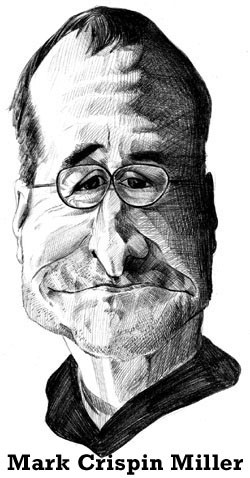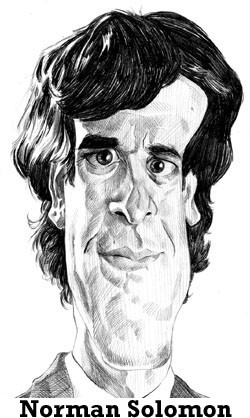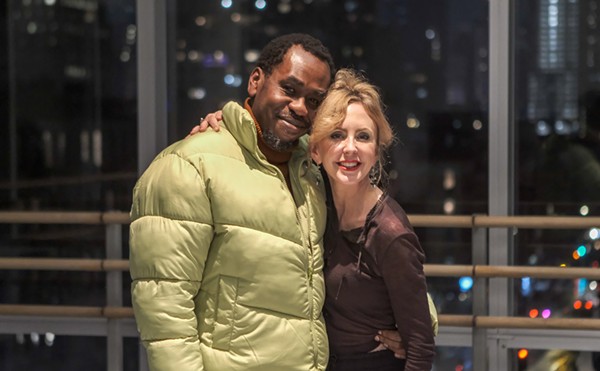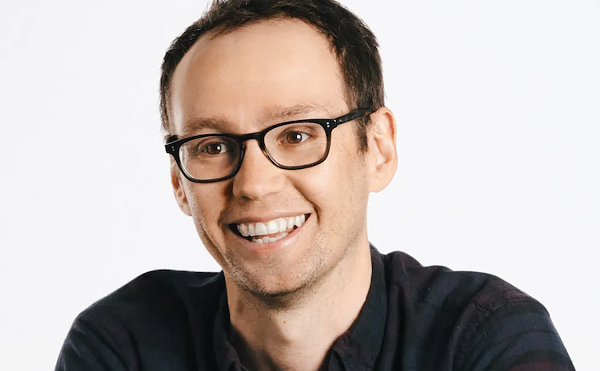On June 2, 2003, the Federal Communications Commission, under the Republican stewardship of Commissioner Michael "Son of Colin" Powell, decided on a radical rewrite of media ownership laws. The Bush-approved decision would have allowed any one of the Big Five media giants – AOL Time Warner, Walt Disney Company/ABC, Viacom, News Corporation and Vivendi-Universal (now NBC Universal) – to own both a newspaper and a broadcast station in the same market. In any of the five biggest markets (New York, Los Angeles, Chicago, Houston and Philadelphia), one company could own as many as three TV stations in a market and 45 percent (raised from 35 percent) of a region's viewership. Ownership of two TV stations – as well as a major newspaper – in nearly all of the largest 100 markets was also deemed kosher. The FCC's decision made the media-merger-friendly Telecommunications Act of 1996 look downright socialist in comparison.
On that day, participatory democracy in America took another step toward extinction and most citizens didn't even know it happened. It was a sadly ironic summation of the state of the media in this country. Yet, thanks to the below-the-radar work of groups like the Prometheus Radio Project and other media-reform organizations, word managed to spread and, once people were finally made aware of what happened, an unprecedented public response to the agency's corporate media giveaway erupted and the FCC received more than two million comments, most of which were highly critical of the decision.
Seemingly oblivious that the FCC is meant to serve the interests of the people, Powell whined of "a concerted grassroots effort to attack the commission from the outside in." During the run-up to the ruling, members of the Big Five met with FCC commissioners and staff at least 45 times, and Powell took 44 industry-paid trips to destinations ranging from New Orleans to London. He met with the public exactly twice. It shouldn't have been too surprising that the very media conglomerates who stood to benefit the most from the ruling were more than a little hesitant to trumpet it on their respective outlets and, despite the tidal wave of post-facto criticism, Powell's FCC seemed quite content to let the rules stand as written.
Luckily, the Prometheus Radio Project and the other media groups weren't content at all. According to John Nichols, writing in The Nation, they petitioned the U.S. Court of Appeals for the Third Circuit in Philadelphia, asserting that "the FCC had endorsed rule changes that posed a genuine threat to localism, diversity and competition – which the FCC is supposed to protect."
Remarkably, the Court agreed, saying that the FCC didn't "sufficiently justify" the notion of "five equal-sized competitors," among many other things. The Third Circuit's ruling, filed in June 2004, called for the FCC to rescind the rules for re-examination. As a result, FCC Commissioner Michael J. Copps, one of two Democrats below Powell on the five-person FCC board, apparently grew enough of a spine to declare in a press release: "The rush to media consolidation approved by the FCC last June was wrong as a matter of law and policy."
For now, the consolidation train has been stalled. But only for now.
INHERENTLY CONSERVATIVE
The media that Powell and fellow free-market true believers prefer is inherently conservative, exclusive, and encourages a continuing narrowing of political discussion while mainly keeping mum on its ideological extremism. Unquestioning in its acceptance of neocon newspeak revisions of liberal ideas – the Healthy Forests Initiative (actually a lumber-industry sweetheart deal) or the Clear Skies Initiative (which undermines existing antipollution safeguards) – corporate media acts as a conduit for an increasingly right-leaning "center" defined by the rarefied interests of the most powerful. It's one reason that, according to recent polls, the majority of Americans still believe in a connection between Iraq and Al Qaeda – despite every credible expert having insisted otherwise.
When asked if it's mere lefty hysteria to worry that media concentration puts democracy itself in crisis, Mark Crispin Miller, New York University communications professor and author of the upcoming Cruel and Unusual: Bush/Cheney's New World Order responds, "Hysteria? Read what the framers had to say about the freedom of the press. The whole point of the First Amendment is not to shield the media's owners from public service obligations, libel suits, censorship, etc. The purpose of the press clause was, and is, to ensure that the people stay informed about the doings of their government.
"We can't have a democracy if everybody in the country knows only what the government would have them know. To the extent that we are merely disinformed and distracted by our media, ours is not a viable republic or democracy, but a state essentially no more enlightened than Stalin's Russia or Saddam Hussein's Iraq."
Some context: In the 1930s, the war for control of the media hit a fever pitch. Some argued that the airwaves should be reserved for educational and community interest purposes. Others saw fortunes to be made by monopolizing the radio spectrum for commercial use. The Federal Communications Commission was created by the 1934 Communications Act, and charged with – among other things – assigning airwave spots to broadcasters, helping manage competition and being a watchdog for the public interest.
By 1935, the networks – NBC and CBS – controlled 97 percent of nighttime viewing. Public service and community-related broadcasts were deep-sixed to the graveyard hours and later allowed to contain advertising. In the 1980s, during the deregulation spree of the Reagan Administration, the Commission dissolved the Fairness Doctrine, which had stipulated equal time for opposing views by political candidates. When Powell's FCC tried to sell off American media through deregulation, its defense boiled down to claims that the agency was merely updating regulatory concepts and that technology – the Internet, mainly – would keep the marketplace of ideas robust.
But how do you search the Internet for information that strays from the "center" when such info is pushed aside in favor of stories of dubious rationale? And when that technology is used to centralize information for multiple-market broadcast to the exclusion of dissenting voices – as is the case with Bush supporter Clear Channel, which owns over 1,200 radio stations – how do you even know who to vote for?
According to Norman Solomon, author of The Habits of Highly Deceptive Media: Decoding Spin and Lies in Mainstream News, coverage of congressional races is particularly notable for how little actually exists. "Most of what TV viewers learn `about congressional candidates` is not from local news but from commercials," he says. "Which is how station executives like it, given the effects on the bottom line. This gives the advantage to incumbents and to candidates with bigger ad budgets. Overall, that means an edge for the Republican Party."
He adds, "The body politic needs free circulation of information and ideas. Any blockage is going to be damaging and perhaps fatal. If we're going to have democratic vitality we need to remove the blockage. And corporate media consolidation ... just think of it as a blood clot."
CLOTS THAT KILL
In his book, The New Media Monopoly, Pulitzer Prize-winning journalist Ben H. Bagdikian recounted a potential disaster barely averted in the small North Dakota city of Minot in January 2002.
A freight train carrying anhydrous ammonia – a fertilizer that creates a noxious, skin-burning, lung-scalding gas – derailed. The local emergency alert system failed, so police called the radio stations – six of them owned by Clear Channel, whose prerecorded material is broadcast nationwide by remote. No one answered the phones for more than an hour and a half. Three hundred people were hospitalized.
About the absolute import of locally produced media, Bagdikian says, "The U.S., unlike any other industrial democracy, leaves central institutions to local control. So if local people are to respond to their judgment about their basic services, they need to know about such functions if they are to make informed judgments on election day." Or as Solomon says, "If you don't know what's happening across town, it pulls the plug from the democratic circuit."
Independent media has existed – and still struggles to do so – in this country. From the 1930s through the '50s, low-wattage stations covered every aspect of immigrant Yiddish culture in New York City. Open political and philosophical discussions shared broadcast hours with rabbi-mediated marriage disputes, klezmer concerts and variety shows. There were even editorials in rhyme. Those now attempting a neo-Yiddish trick with low-wattage, noncorporate radio can be arrested, as non-FCC-approved broadcasting is a federal crime.
WHAT LIBERAL MEDIA?
Back in 1988, the average candidate sound bite lasted 9.8 seconds. By 2000, it was down to 7.4. On July 18, 2004, The Washington Post ran a story which quoted the President's election platform: to make the United States "safer and stronger and better." Not only was this somewhat vague, but it ran the danger of setting a precedent of lowering political sound bites down to a dauntingly brisk two seconds (the time it took this writer to say these five words quickly). Such miniscule time spans disallow even semiserious discussion of anything. But that's corporate media in a nutshell: offering less about fewer subjects.
Meanwhile, the rightward slant seen in the mass-media news shows is, according to Solomon, due to "relying on official sources. Journalists who go outside the official, corporate sources are subjected to criticism." They might even be called liberals.
According to Fairness and Accuracy In Reporting (FAIR), a self-proclaimed media watch group, a 2002 study of the major networks' nightly news broadcasts found that, of partisan sources appearing on the networks' nightly news, 75 percent were Republican and only 24 percent Democrats. Meanwhile, among ideological guests appearing on Special Report with Brit Hume, Fox's "signature news show," conservatives accounted for 72 percent of guest talking heads, while centrists made up 15 percent and progressives 14 percent.
OK. But what about National Public Radio, that supposed bastion of liberalism?
Eighty-three percent of journalists appearing on NPR came from commercial U.S. media outlets such as the The New York Times and The Washington Post. Republicans outnumbered Democrats by more than 3 to 2 as partisan news sources. "Individual Republicans," notes a FAIR report, "were NPR's most popular sources overall, taking the top seven spots in frequency of appearance." Meanwhile, NOW with Bill Moyers, the only progressive show on television, will soon be cut down from 60 to 30 minutes. Filling the gap are programs hosted by Tucker Carlson (a neocon formerly of CNN's Crossfire, whose PBS debut claimed Kenneth Starr as its first guest) and Paul Gigot (a conservative Wall Street Journal editorial page editor). Aside from the fledgling liberal Air America (17 stations) and NOW, the concept of a liberal slant in news predominantly exists as a fantasy talking point for neocons intent on widening the cultural divide they helped fabricate and that corporate media helps disseminate.
In 2003, News Corporation – owners of everything Fox – enjoyed revenues of $17.5 billion. General Electric, the manufacturer of the F-16 fighter jet, Abrams tank, and Apache helicopter, and whose media holdings include NBC, Universal Pictures and MSNBC, brought in $134.2 billion. Despite such continuous heady profits, fueled in part by the media near-monopolies Powell's FCC has no problem with, newsrooms are still under heavy profit pressure. According to Peter Phillips, director of Project Censored, "to `generate those profits` you cut staff, you cut salaries and you look for sources of news that are reliable and consistent." (JournalismJobs.com statistics support Phillips' claim: As of 2003, media companies laid off about 30,000 employees in a two-and-a-half-year period.)
"Reliable and consistent" means dependence on elite sources. This often results in unintended comedy that's more depressing than it is funny. On April 29, 2004, CBS ran a story called "Terrorism Down – Not Counting Iraq", claiming "The State Department reported Thursday there were fewer international terrorist attacks last year than any time since 1969." On June 22, 2004, there came a whoopsie update: "Revised Report: Global Terror Up." In part, it read: "Correcting an inaccurate report, the State Department announced Tuesday that acts of terror worldwide increased slightly last year."
The "Terrorism Down" story gave readers two months to marinate in the false impression that the Bush regime was winning the "war on terror." The "revision" was blamed – by the Administration – on shoddy work by the outsourced workers who helped collate the data.
The GOP has cynically taken to using the media as a test-marketing/damage-control device. Hence all those scary terror announcements that always pop up with urgency (but not enough urgency to raise the "threat level") right after Bush/Cheney '04 has gotten bad news. Or as Solomon says, "If Bush, Ashcroft or Cheney step up to the microphone and utter the word 'terrorism!' and say there's something new, even if there isn't, it's very rare it's not on the front page."
REALITY? DON'T WORRY ABOUT IT
The current national discourse operates in two realms of perception that, though they seldom cross, are mutually beneficial and equally threatening. One is represented by the corporate information stranglehold: the networks, "local" radio, newspapers, cable. (As noted by CNN founder Ted Turner, writing in Washington Monthly, "The top 20 Internet news sites are owned by the same media conglomerates that control the broadcast and cable networks.") The other reality, the one the FCC and the Bushies would rather most Americans not know exists, is the one that matters.
It's a moneyed, murky realm of far-right wingnut academic theory, hawkish think tanks such as the American Enterprise Institute and secret government agencies with spy movie designations like The Office of Special Plans. It's where names like Leo Strauss are the intellectual coin of the realm. One can find out about this world, but as they say, if you have to ask, you probably can't afford it.
Well, since you asked.
Leo Strauss, an obscure political philosopher, can posthumously count among his acolytes Weekly Standard editor William Kristol, Deputy Secretary of Defense Paul Wolfowitz, Richard Perle (a behind-the-scenes architect of the Bush administration's pre-emptive, unilateralist foreign policy) and Vice President Dick Cheney.
As International Herald Tribune columnist William Pfaff put it, Strauss taught that "society and history should be held by an elite, and withheld from others who lack the fortitude to deal with truth." Also: The masses need the assurance of religion (the elite need not believe themselves) and should be fed a steady diet of "noble lies." Which might help explain why, even after the 9/11 Commission's conclusion that Al Qaeda and Saddam Hussein had no "collaborative relationship," Cheney continued to support the claim, saying that he "probably" had information about Iraq's links to terrorists that the commission members did not learn during their investigation. And by the way: A search for mentions of Strauss in the major networks' online news services brought up a total of three related articles.
Says Miller, "They believe in theocracy, in fact. They're mostly Christo-fascists, along with certain business types whose only interest is their bottom line. Those working to theocratize the U.S. have no qualms about misusing words or lying in any way. It is, indeed, a sign of merit to lie, if one is lying for the cause.
"The neocons around Cheney/Rumsfeld, while not Christians, for the most part, have a very similar ideology. As believers in the political philosophy of Leo Strauss, they believe that theocracy is the best possible form of government, because it keeps the people docile. And they too believe that lying for their cause is not merely permissible, but obligatory. They see themselves as the virtuous few who do the actual ruling of the nation, by manipulating the prince."
DISASTROUS CONSEQUENCES
Although the empire will fight back, the circuit court's rebuttal of the FCC's decision stands for something important. Inspirational, even, in a contextually depressing way. What we heard in Philadelphia was the explosive sound of the thin walls separating the two realms being blown to smithereens – and the din of big media being hoist with the petard of its own contempt, greed and arrogance. It was the sound of about 2 million Americans and eventually 100 members of Congress finally paying attention, getting royally pissed off and for a change, doing something about it. In short, and for now, and despite a media beholden to the god of the bottom line and a shadowy elite's "noble lies," what we heard here was the true sound of democracy.
But as Bagdikian emphasizes, "Democracy must be defended and expanded by every generation." And as Miller warns, there's "no time for a breather. While it was indeed a major victory, it did not change the status quo ante. The concentration that's in place already has disastrous consequences every day."




















